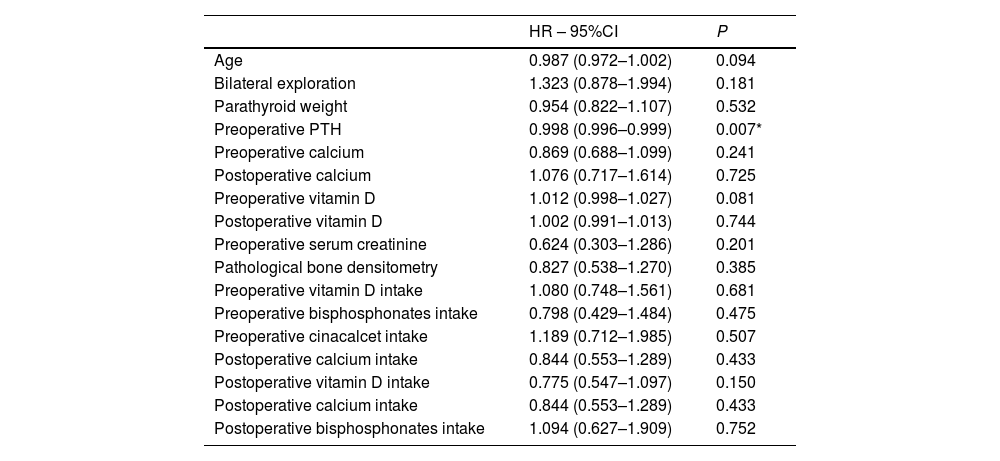This study aimed to determine the time to normalisation of postoperative parathyroid hormone levels after successful parathyroid surgery and to analyse the pathophysiology of postoperative normocalcaemic hyperparathyroidism.
MethodAn observational retrospective study was conducted on a cohort of 186 patients who had undergone parathyroidectomy for primary hyperparathyroidism over a 5-year period. Demographic characteristics, surgical and histopathological data, bone densitometry (pre-and postoperative pharmacological treatment), creatinine plasma levels, and pre-and postoperative parathyroid hormone, calcium and vitamin D levels were recorded as predictive variables. The time to normalisation of the postoperative parathyroid hormone levels was recorded as the output variable. A univariate analysis was performed to investigate the factors related to the time to normalisation of parathyroid hormone levels.
ResultsThe final study sample was comprised of 176 patients, 46 of which (26.1%) had elevated postoperative parathyroid hormone levels and normocalcaemia. The median time to normalisation of the postoperative parathyroid hormone levels was 6 months. The cumulative probability of having normal parathyroid hormone levels 30 months after surgery was 89%. The time to normalisation was associated only with preoperative parathyroid hormone levels (P = .007; HR: 0.998). Vitamin D and creatinine levels were not associated with time to normalisation of parathyroid hormone levels (P = .744).
ConclusionsPersistently elevated postoperative parathyroid hormone levels with normocalcaemia may occur in one-quarter of patients after parathyroidectomy. Parathyroid hormone levels normalise in up to 90% of cases by 30 months. A high preoperative parathyroid hormone level is predictive of postoperative normocalcaemic hyperparathyroidism, and vitamin D deficiency does not seem to influence the pathogenic mechanism.
El objetivo del estudio fue determinar el tiempo hasta la normalización de los niveles postoperatorios de hormona paratiroidea después de una paratiroidectomía exitosa y analizar la fisiopatología del hiperparatiroidismo normocalcémico postoperatorio.
MétodosSe realizó un estudio observacional retrospectivo en una cohorte de 186 pacientes sometidos a paratiroidectomía por hiperparatiroidismo primario durante 5 años. Datos quirúrgicos, densitometría ósea, tratamiento farmacológico, niveles plasmáticos de creatinina; y niveles pre y postoperatorios de hormona paratiroidea, calcio y vitamina D se analizaron como variables predictivas. El tiempo hasta la normalización de los niveles de hormona paratiroidea postoperatoria se registró como variable principal, realizándose un análisis univariante para investigar los factores relacionados.
ResultadosLa muestra final del estudio incluyó 176 pacientes. De estos, 46 pacientes (26,1%) tenían niveles postoperatorios de hormona paratiroidea elevados y normocalcemia. La mediana del tiempo transcurrido hasta la normalización de los niveles de hormona paratiroidea fue de 6 meses. La probabilidad acumulada de tener niveles normales de hormona paratiroidea a los 30 meses fue del 89%. El tiempo hasta la normalización se asoció sólo con los niveles preoperatorios de hormona paratiroidea (p = 0,007; HR: 0,998). No se encontró asociación con los niveles plasmáticos de vitamina D ni de creatinina (p = 0,744).
ConclusionesUna cuarta parte de los pacientes intervenidos de paratiroidectomía pueden presentar elevación postoperatoria de la hormona paratiroidea con normocalcemia, normalizándose en el 90% de los casos a los 30 meses. Un nivel alto de hormona paratiroidea preoperatoria predice el hiperparatiroidismo normocalcémico postoperatorio. La deficiencia de vitamina D no parece influir en el mecanismo patogénico.














